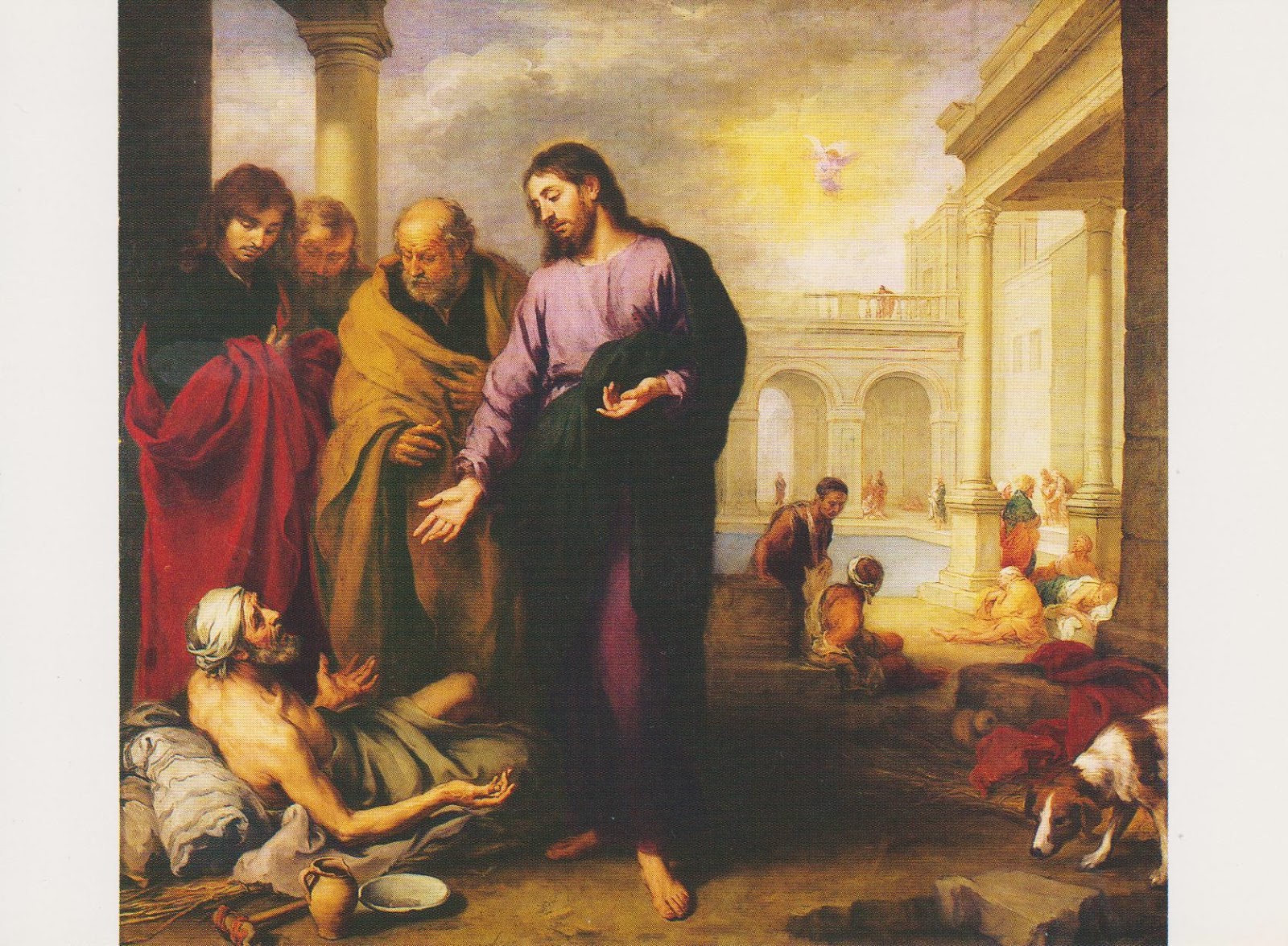4th Epiphany
John 5: 1-18
Some time later, there was a
Jewish feast, and Jesus went up to Jerusalem. Now there is in Jerusalem, near
the Sheep’s Gate, a pool, called Bethesda in Hebrew, which is surrounded by 5
covered porches. Here lay a great many invalids, the blind, the lame
[crippled], the weak [withered], waiting for the water to begin moving. For
from time to time a powerful angel of the Lord descended into the pool and
stirred up the waters. The first one in the pool after such a disturbance would
be cured of whatever ailment he had.
And there was a certain man there who had been an
invalid for 38 years. When Jesus saw him lying there and became aware that he
had been ill for so long, he asked him,
“Do you want [have the will] to become whole?”
The invalid answered him, “Lord [Sir], I have no
one to help me into the pool when the water is stirred. While I am trying to
get in, someone else goes down ahead of me.”
Then Jesus said to him, “Rise up, take up your
pallet, and walk.” At once the man was healed
and picked up his pallet and walked.
However it was the Sabbath on that day. Therefore
the Jewish leaders said to the man who was healed, “It is the Sabbath; the law
forbids you to carry your pallet.”
But he replied, “The man who healed me said to me,
“take up you pallet and walk!”
And they asked him, “Who is the man who said to you
‘take it up and walk’?”
But the one who was healed had no idea who it was,
for Jesus had slipped away, as there was a crowd in the place.
Later, Jesus found him in the Temple and said to
him, “Take to heart what I say: Behold, you have become whole. Sin no more,
lest your destiny bring you something worse.”
The man went away and told the Jewish leaders that
Jesus was the one who had healed him. That is why they persecuted Jesus and
sought to kill him, because he did these things on the Sabbath.
Then he himself countered them with the words,
“Until now my Father has worked, and from now on I also work.”
Then they sought all the more to kill him, because
not only had he broken the Sabbath, but also because he had called God his own
Father and had set himself equal to God.
4th
Epiphany
January
28, 2007
John
5: 1-18
There
are two kinds of extremes in the way our soul conducts itself. One extreme
might be called “too tight a grip”. It is the temptation to plan and control
everything and everyone, down to the last minute and penny. There is no room,
no gap for the divine spark to ignite.
The
other extreme might be called the soul’s “failure to thrive”. In this extreme,
the soul is weak and lamed; it blames everyone and everything outside of itself
for its own failures. “I have no one to help me into the pool when the water is
stirred…someone always gets there ahead of me.” John
5:7
In
the story Christ first raises the man’s awareness with His question: is it your
will to become whole? The man’s answer is essentially a divided one: “Yes,
but….” So Christ supplies the missing strength. Thirty-eight years of paralysis
have built up some measure of resolve in the man; Christ adds what is lacking.
Yet
the man’s soul weakness, which was at the basis of his bodily paralysis,
continues to be evident. He is still not yet sovereign over what happens. When
others tell him he shouldn’t be carrying his pallet, he tries to justify
himself by shifting the blame for breaking the Sabbath onto Jesus. Excuses
again.
So
Jesus finds him in the Temple and offers follow-up therapy. “You have become
whole; sin no more, lest your destiny bring you something worse.” John
5:14
The paralytic’s sin consists of not be able to act out of
his own initiative, out of his own integrity. He has literally been raised to a
new level. If he goes back to his old ways, his destiny will be forced to take
more extreme measures in order to enforce his continuing evolution and growth. Once
a higher level of functioning has been reached in the soul, there is no going
back.
Here,
in consecrating ourselves, we offer our integrity, or at least as much of the
broken pieces of it we can gather up. The formative character of Christ’s body
helps us consolidate our efforts, our soul’s gains. The fire of the wine mixed
with water strengthens our will, dissolves our souls’ hardness, and helps us
move forward. We cannot do it all by ourselves. Yet neither can Christ. Bit by
bit a lifetime of weakness is given strength by what Christ adds to our own
efforts at destiny. He gives us the strength of Himself, ‘the medicine that
makes whole.’


No comments:
Post a Comment